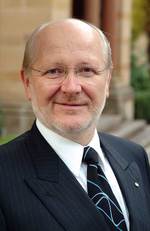From the Vice-Chancellor
The world has witnessed yet another Olympic Games, bringing together nations and people from across the globe. While these nations are competing at the highest level, they also share in a spirit of peace and a collective sense of humanity. Geoffrey Blainey's famous "tyranny of distance" has been all but overthrown through advances in telecommunications, and it is now possible for the experience of the Olympics to be shared across most of the world. At the same time the Games themselves, while retaining many of the original sporting events, nevertheless continue to change and adapt to reflect a changing world. In many ways, universities are like this. Australian universities are no longer competing at a local or even a national level - we are active on the international stage. We compete worldwide for students and for research funding. When you consider that there are more than 20,000 universities in the world, that is a great many "teams" to be competing against. In spite of the enormous numbers, universities also have shared experiences - we collaborate at an institutional level, and many of our most valuable partnerships have been at the level of individual researchers and research teams. Could you imagine a relay team with the Australian and US swim teams actively working together to win the same medal? It makes sense for universities to join together to solve research problems, to create educational opportunities and to share cultures. At the University of Adelaide, we have more than 160 official agreements in place with institutions outside Australia, in more than 30 countries. The number of those agreements increases every year, and they provide unique opportunities to explore mutual interests in education, research and scholarship, provide exchanges for students and staff, collaboration on research projects and sharing of academic materials, publications and information, course delivery (including short courses) and joint awards, credit transfer for students, and many other benefits. As our world becomes smaller through technology, and as competition increases, we need to adapt and change to keep pace. Universities that fail to do this are likely to be left behind in the race for students and resources. While many of our linkages have been pitched at the Asia-Pacific region, the US and Europe/UK, one area of emerging growth in international collaboration is in Latin America. At the suggestion of the Brazilian Ambassador, the University of Adelaide was pleased to organise and host a special seminar last month that enabled South Australia and Latin American countries to explore opportunities for closer ties. Opened by Premier Mike Rann, the seminar involved representatives from Chile, Argentina, Brazil, Mexico and Venezuela. There are many opportunities for us to collaborate, including in the areas of mining and engineering; energy, environment and water management; and agriculture, food and wine. The seminar was a huge success, and we look forward to more opportunities like this. While the Olympics may be over for another four years, our work to build international bridges continues. Beijing 2008 showed the world that, technologically at least, the playing field is all but level, and that is as much true for universities as it is for sport and many other transnational activities. By London 2012, the competition for students and resources will be even stronger than it is today - but we will also be stronger, in part due to the many "teams" of which we are a part. PROFESSOR JAMES A. McWHA
Vice-Chancellor and President
|





